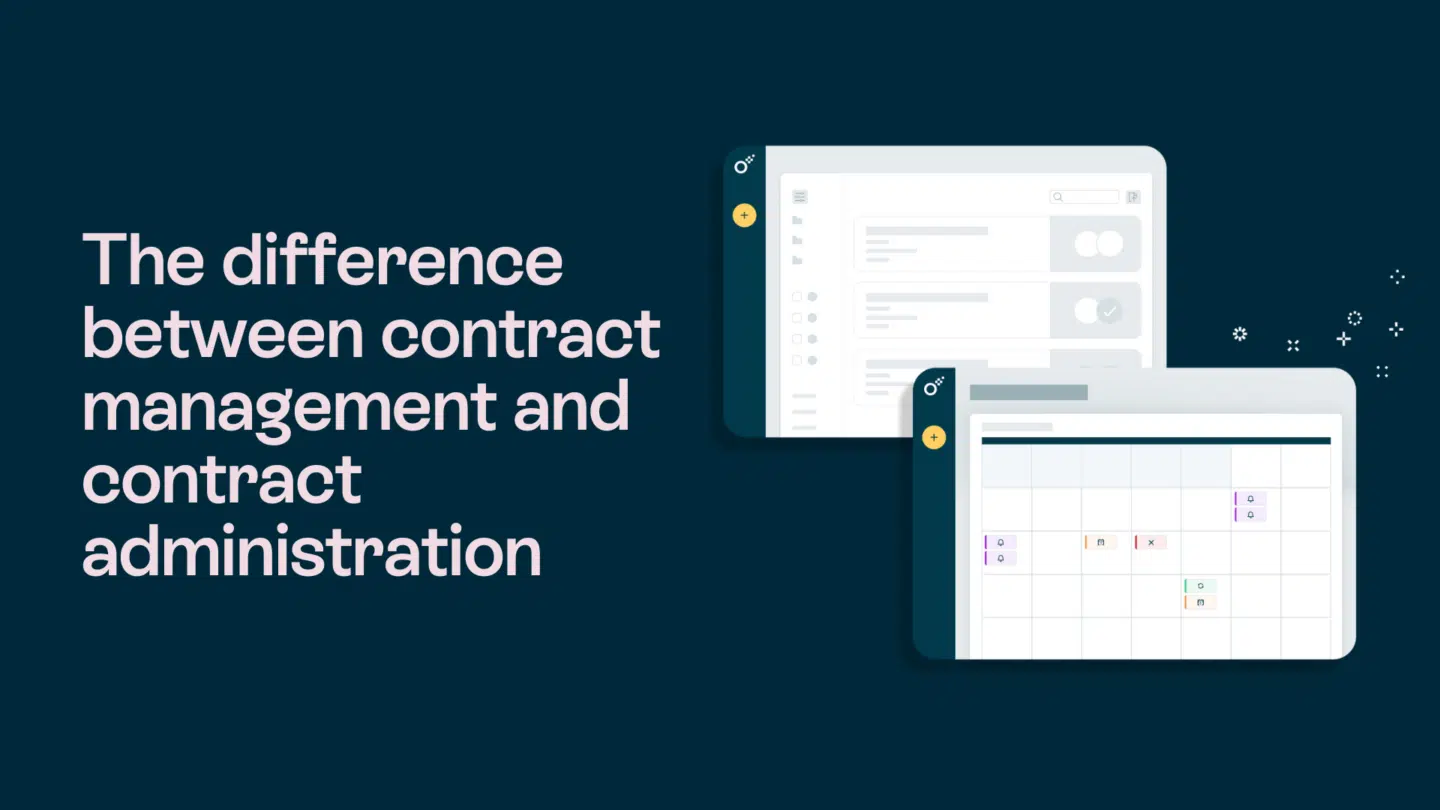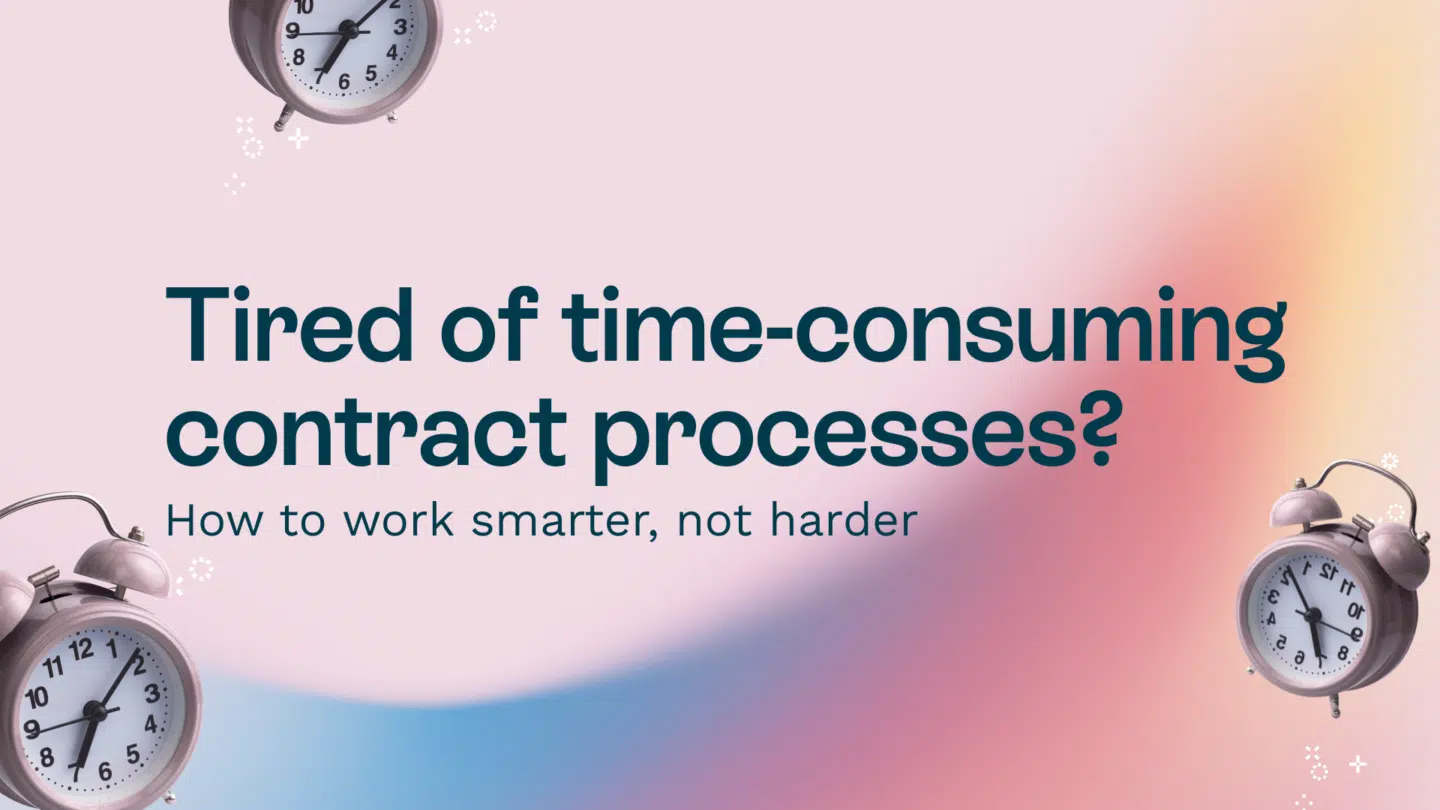
Can you imagine drafting, reviewing, and signing every single contract manually when you’re handling hundreds or even thousands of contracts monthly? You probably can’t, and with good reason – the contract process would take ages (maybe even literally). Thankfully, we’re way past the point where such things are necessary, with contract automation software at our fingertips. However, as The State of B2B Contracts 2024: Exploring Contract Management Trends report highlights, still only 17% of respondents get a contract signed in less than one day.
That’s why you need specialized software and automation tools to get the job done.
In this article, we’ll help you with implementing contract automation software and answer questions like what, precisely, is contract automation? How does it work? And how can it help you?
What is contract automation?
Contract automation means using software to oversee the entire lifecycle of a contract – from drafting and signing all the way through to storage and renewal. It helps you draft and review agreements faster and streamlines the signing process to make it as quick and effortless as possible. Contract automation is for various teams: founders, sales, HR, legal, procurement, finance, marketing, and anyone dealing with contracts within a business. Moreover, it doesn’t require complex, costly and time-consuming integrations. You can set it up quickly through great contract management software.
Which contract management tasks can be automated?

Contract automation tools speed up multiple tasks, saving time and money. They help with:
- Faster and easier signing: Contract automation software with digital or electronic signature functionality lets you sign agreements without printing or mailing them to counterparties. This is particularly useful if you have multiple signatories or if a signing order is required.
- Fast contract creation: Templates and AI tools help you draft contracts faster and reduce the number of errors and compliance issues. Moreover, integrated contract automation software can reuse and sync with data available in existing systems within the business.
- Clarity in contract collaboration: Comment, review, and adjust contracts in real time so that all the stakeholders involved are always up-to-date with the latest changes since there is only one version of the contract.
- Centralized reviews and approvals: Make changes and get them approved in seconds with suggestions, redlining, and an in-contract chat function. You can also use contract automation software to approve documents before they are ready to sign.
- Contract personalization: Add interactivity to contracts with features such as product and pricing tables, videos, form fields, dynamic sections, and personalized branding.
- Automated status tracking: Contract software automates the tracking of the signing status, which means you can monitor when stakeholders open a contract, how many times they’ve accessed it, and the timestamps of their first and last views. This information helps you gauge engagement levels and identify if further communication is needed.
- Change notification and reminders: Notify all involved parties that a change has been made. Send automatic reminders to review or sign the contract up until the moment the contract is signed.
Who can benefit from contract automation?
We’ve all lost an important document at some point in our lives. But great contract automation software can ensure that that moment of sheer panic doesn’t happen again. What other problems can contract automation solve? It provides many benefits for different teams, departments and use cases:
- Sales teams can shorten the sales cycle through automated creation, collaboration, and execution of contracts and proposals. They can quickly generate dynamic, interactive contracts using customizable templates, allowing clients to input information directly and engage through embedded videos or personalized messages. Real-time collaboration features enable both parties to discuss and modify contract terms within the document, facilitating swift resolutions and faster deal closures.
- HR teams can automate HR contracts and streamline the recruitment process, improving the candidate experience and reducing administrative tasks. They can create dynamic, interactive employment contracts using customizable templates, allowing candidates to input their information directly and engage through embedded videos or personalized messages. Real-time collaboration features enable HR professionals and candidates to discuss contract terms within the document, facilitating swift resolutions and faster onboarding.
- Procurement teams enable vendors to input necessary information directly into contracts, reducing email exchanges and accelerating the contract cycle. Contract automation offers enhanced control through the use of standardized templates, regulated content modifications, and secure, searchable archives. Additionally, with lifecycle management features, including timely notifications and comprehensive overviews of contract statuses, procurement teams can ensure efficient procurement processes.
And the best part? Oneflow lets you store all contracts in one secure place and sync document metadata with other integrated systems your teams are using (such as your CRM system), which maintain a single source of truth and improve collaboration between departments and outside stakeholders.
See also: HR workflow automation: An essential guide

Choosing the right contract automation software
The first step to optimizing your contract processes with contract automation is choosing the right platform for your business. But what should you look for in contract automation software? Here is a list of the most essential features:
- Fast contract creation – Great contract automation software allows you to generate contracts in a few clicks and gives you the ability to create your own templates.
- Collaboration tools – Collaborative contract management software lets multiple people involved in the negotiation review, comment, and edit the contract simultaneously in real time. The best solutions can also streamline contract management workflows, from requesting approvals to notifying relevant parties of contract changes.
- Centralized repository – Storing all contracts in a centralized repository, preferably with advanced filters and a search function, ensures that they are easily accessible, organized and searchable.
- Signing options – Look for contract automation software that comes with multiple signing options, whether it’s through email or SMS, electronic ID, wet ink or a handwritten signature feature. Evaluate the levels of electronic signatures in compliance with the eIDAS regulation. Better yet, if it comes with a signing order.
- Contract management features – Choose a contract management platform with extra security features, like custom access and permissions, to make it safe from unauthorized access and aligned with the overall information security policies. The best contract management software automatically lets you know when a contract is up for renewal.
- Advanced search and reporting – Make sure the contract automation solution offers advanced features that allow your team to quickly and easily locate specific agreements, contract data, terms and clauses. This helps organizations stay on top of contractual obligations and reduce the risk of legal disputes.
- Analytics – Take away the guesswork with contract management software that gives you real-time insights into who’s opening and interacting with your contracts.
- Integrations – From CRM to HRM systems to project management tools, native integrations help companies improve workflows and maintain a single source of truth by allowing easy access to the same data and features without the need to switch applications constantly.
- AI in contracts – The modern contract automation software increases speed and precision in contract drafting, single and bulk reviews, search and much more with the power and advancement in AI. Ensure you invest in a scalable solution that can handle and anticipate the future needs of your business.
Oneflow is a contract automation platform that provides all that and more. It offers powerful automation features, AI capabilities, collaboration tools and legally binding e-signatures that support various signing methods. It allows you to manage and automate contracts throughout all stages of their lifecycle – from their conception to the post-sign phase. Finally, it’s also easy to integrate with your existing IT infrastructure.

Let’s illustrate Oneflow’s capabilities in more detail.
Create contracts in seconds
We’ve all been there: scouring a Google Docs to check if everything is where it should be before converting it into a PDF for sending. With the right contract automation software, that’s now a thing of the past.
For example, templates are a great feature that speeds up contract creation. We have some of our own, but your legal teams can also help draft some that the rest of your team can later use as the basis for issuing new agreements.

Sign with peace of mind
B2B sales can take a long time. Thanks to the benefits of digital contracts, signing is easier and faster than ever before.
The parties involved in the signing process can use various signing methods, such as:
- Electronic identification (AdES) – Sign using electronic IDs to enable a better level of safety and identification.
- Standard e-signature (SES) – Use the most common method of signing digital contracts to get everything with a simple click of a button.
- SMS verification (SES) – Sign using a 6-digit code sent to the counterparties’ phones.
- Handwritten signature (SES) – Use a so-called “wet ink” signature, which allows people to sign documents by physically writing their name on the screen of a device.
Store and manage all of your contracts in one place
PDF contracts often have to be printed, signed with ink, scanned, sent back, and either printed out and filed or stored in folders or, worse, physical file archives. That’s a lengthy process, and it’s easy to lose important paperwork in the process, no matter how organized you are.
Contract management software, however, helps you store all your contracts in one place, organized with custom access and folders mirroring your organization. Oneflow includes a safe repository or digital archive, so your team can find any contract they need in just a few clicks.
See also: Contract lifecycle management: A complete guide
Moreover, Oneflow lets you automatically remove any personal data you don’t need and set up and automate workflows that delete old and rejected contracts. This ensures you’re always GDPR compliant.
You’ll also get reminders when a contract is up for renewal or expires. Additionally, the archive lets you set up access controls for increased privacy measures.
See more: Top 17 workflow automation tools in 2024

Maintain a single source of truth with native integrations
Oneflow automates contracts for HubSpot, Salesforce, Pipedrive or other platforms you use. Bi-directional data sync means that you need only work in one solution for your work to be saved elsewhere, all without downloading and then uploading drafts and signed contracts! The integration lets you automatically create and send Oneflow contracts based on HubSpot triggers, helping you centralize and streamline key sale processes.
Oneflow comes with many different plug-and-play integrations – from Teamtailor to Google Workspace to Zapier – and they’re super easy to set up. By connecting our solution with other systems, you can create, negotiate and track the progress of contracts without leaving your CRM system (useful for sales teams) or auto-populate agreements with data from an ATS solution (handy for HR teams and recruiters).
Streamline contract processes with AI
Oneflow also includes AI capabilities such as:
- AI Review/Review Plus – speeds up contract review time and lets you identify and mitigate risks and compliance issues.
- AI Import – allows you to import contracts from outside Oneflow and use the platform’s full capabilities while working on them.
- Write with AI – helps you edit, write, and manage your contracts. Identifies organizational mistakes.
- AI Search – lets you search your contracts database more effectively and intuitively.
How to automate contracts with Oneflow
Having multiple possibilities at your fingertips is great, but software also should be easy to use. Thankfully, Oneflow is very intuitive. You can create agreements directly from your document file. Start with a contract template or read a step-by-step on how to do this in our contract creation article. In the meantime, let us walk you through the contract automation possibilities that make this process even smoother.
Oneflow’s AI features help you draft contracts and review their contents for errors and compliance issues. They’ll also make finding key documents you need much easier – even ones you created without using our platform – you can import these agreements into Oneflow and still access its powerful capabilities to improve them.
The platform lets you set up reminders in the calendar, which will help different teams and departments cooperate and stay on top of deadlines.

You can also automate the signing queue – Oneflow will notify you when it’s your turn to sign the agreement. This can be very helpful with many co-dependant counterparties.

Can it help both B2B and B2C companies?
In short – yes, contract automation can help both B2B and B2C companies. We’ve already looked at some of the B2B benefits. But what about the B2C benefits?
Whether it’s a gym membership, a phone contract, or a mortgage, contract automation allows your agreements to be more adaptable to your customers’ expectations. You can meet their needs immediately and create a more customer-focused experience.
Conclusion
Automating contract lifecycle management processes can genuinely transform your business, leading to faster contract creation, better accuracy and compliance thanks to the automated workflows with centralized control. It’s useful for all industries and departments. Oneflow is easy to use and offers powerful automation features, AI enhancements and many valuable integrations.
Interested? Try Oneflow and all its contract management process automation capabilities with our free 14-day trial. If you’re not ready to commit yet, you can also book a live demo with our team.
FAQs
How does contract automation work?
Contract automation streamlines contract creation and management processes by overseeing the entire contract lifecycle, from creation to renewal. This technology allows for the faster generation of contracts, collaborative editing, centralized approvals and secure signing options, enhancing efficiency and reducing the risk of human error.
How to automate contract drafting?
You can automate contract management with digital tools such as Oneflow that leverage AI to streamline contract creation. Our AI capabilities include automatic review, importing contacts, spotting mistakes and smart search. You can also use our templates to speed up the contract creation process or make your own.
What are the benefits of contract automation?
Contract automation tools increase speed in operations, improve accuracy and compliance and lead to significant cost savings since your team spends less time on manual contract management tasks.
How to automate contract signing?
Invest in software such as Oneflow that enables parties to use legally binding electronic signatures. These platforms employ various signing and verification methods (SMS messages, electronic identification, handwritten signature etc.).







